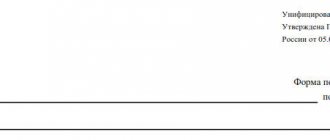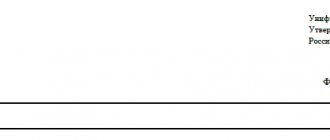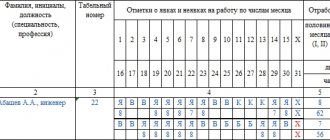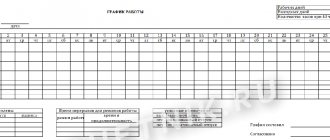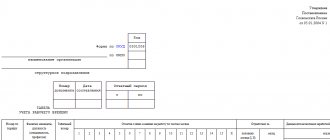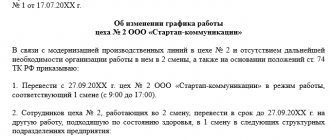What is the difference between short-time and part-time work?
Labor legislation provides for 2 options for reducing workload by reducing the time spent on performing job functions:
- If the standard number of hours for a period (week) is reduced on the basis of legislative provisions as a result of classifying an employee or the circumstances in which he works as a special category, we are talking about reduced working hours (Article 92 of the Labor Code of the Russian Federation).
- If the employee and the employer have agreed with each other that this employee, due to some circumstances, spends less time on the labor process, this means that the employee will have part-time work (Article 93 of the Labor Code of the Russian Federation).
From Art. 92 and 93 of the Labor Code of the Russian Federation, the following specific differences arise between the 2 types of special working time regime.
| Characteristic | Shortened working hours | Part-time work |
| Installed on base | Legal requirements | Agreements between employees and employer |
| Regarding the obligations and rights of the employer there will be | Duty always |
|
| In terms of rationing | Seen as the norm | Considered a downward change in the established norm |
| In terms of salary/compensation | Paid as regular hours worked (salary for this position is not reduced) | Only the time actually spent on performing the functionality is paid (i.e., the salary is reduced compared to that established for the position) |
Do pregnant women need to set a special schedule?
The legislation does not provide for shortened working hours for pregnant women. A pregnant woman has the right to write an application with a request to transfer her to part-time work, but she is not entitled to a reduced one. The employer is obliged to satisfy the employee’s request and issue an order to reduce the workload on her.
But the salary will be calculated based on the number of hours worked (it will become lower). A pregnant woman will not be able to claim the full amount while working part-time.
What regime does the order to reduce working hours apply to?
How to name the order correctly depends on the employer’s goals:
- If the order is issued to comply with the requirements of Art. 92 of the Labor Code of the Russian Federation, then it will really be an order on reduced working hours . Moreover, its role will be complementary to the main order of registration (read about it below).
- If an employer wants to reduce the working time of its employees in pursuit of its own economic goals, we must talk about part-time work.
It should be noted that the employer is also limited by Art. 74 of the Labor Code of the Russian Federation, which lists a closed list of cases when, in principle, it is permissible to reduce the duration of working hours and payment for it at the initiative of the employer.
Decor
A shortened work week at the initiative of the employer requires adherence to strict consistency in registration. Each stage must be documented exclusively in writing.
In order for an organization to establish reduced working hours, it is necessary:
- Issue an order that warns all employees about the change in the working regime. The document must: justify the need to switch to a new regime; list those departments that will work according to the new schedule; specify the specific operating mode. In addition, the document must indicate the start date of work according to the new schedule and the period for which the regime is established. Responsible persons who will notify the team about innovations should be indicated.
- Notify the work team. Employees affected by the innovation must be notified of this two months in advance. Failure to comply with established standards may result in litigation. Notices must be in writing. Each employee must sign for receipt of this notice. If you do not want to sign the notice, you must draw up a corresponding act in the presence of two witnesses.
- Provide information to the labor exchange. Within three days from the date of the decision to establish a new regime in the organization, management must report this fact to the employment center. If this fact is ignored, the organization may be fined.
Who is entitled to reduced working hours under Art. 92 Labor Code of the Russian Federation
The standard amount of time allocated by the Labor Code of the Russian Federation for a worker to perform work duties during the week is considered to be 40 hours. All permissible deviations from the general rule are specifically considered by legislators, including the regime of reduced working hours.
According to Art. 92 of the Labor Code of the Russian Federation, reduced working hours are established :
- for the age group up to 16 years - 24 hours;
- persons from 16 to 18 years old - 35 hours;
- disabled people of groups 1–2 - 35 hours;
- workers under the influence of negative factors - 36 hours.
Additionally in Art. 92 of the Labor Code of the Russian Federation considers the situation when an employee who has not reached the age of majority combines educational and work processes. In relation to such an employee, ½ of the standard established for this age category should be applied:
- up to 16 years old - 12 hours;
- from 16 to 18 years old - 17.5 hours.
Payment Features
A work week of this type will be paid as a full week, but subject to some exceptions. A shortened working week according to the labor code for minor workers will be paid according to the time actually worked or the amount of work performed. In other words, work is paid in proportion to these indicators.
But, despite legal regulations, the employer has the right to make additional payments to its employees who are working short-time. In particular, he can pay for work at the same rate that full-time employees receive, but under certain conditions. How should additional funds be paid if an employee has a reduced work week? Payment must be made as remuneration for overtime work.
Provisions of other laws specifying aspects of reduced working hours
In addition to those given in Art. 92 of the Labor Code of the Russian Federation, reduced working hours are established for some other groups of workers. Instructions for reducing the temporary load are contained in other articles of the Labor Code of the Russian Federation and federal laws.
The most common reduction in working hours is:
- For teachers and teachers - up to 36 hours a week (Article 333 of the Labor Code of the Russian Federation).
- For medical workers - up to 39 hours a week (Article 350 of the Labor Code). At the same time, based on the position held and practical functionality, the maximum amount of working time for a physician can be specified. For this, an additional document is used - Decree of the Government of the Russian Federation dated February 14, 2003 No. 101. It approved the lists of medical supplies. specialties and functional characteristics for positions for which the time load is 30, 33 or 36 hours per week.
- Female workers in rural areas. In this case, the Resolution of the Supreme Court of the RSFSR “On improving the situation of women in rural areas” dated November 1, 1990 No. 298/3-1 is in effect, which is consistent with the norms declared by the Labor Code of the Russian Federation (Article 423). Women working in rural areas should be provided with a working week of 36 hours.
- Female workers working in northern regions and places with similar conditions. They are also provided with a reduction in the weekly workload by 4 hours compared to the general standard (Article 320 of the Labor Code of the Russian Federation).
Important! If an employee is entitled to reduced working hours by law, but in practice there is no reduction in time workload, the employee has the right to demand that the excessively worked time be considered as overtime and compensated accordingly.
For more information about compensation for labor in excess of the standard, see the article “How is overtime paid under the Labor Code of the Russian Federation?”
Reducing working hours under negative working conditions
Negative working conditions mean the presence of factors in the workplace that pose risks to the health of workers. The presence of such circumstances may be:
- Provided for by separate industry laws (regulations) for the entire industry. For example, according to the Federal Law “On Work with Chemical Weapons” dated November 7, 2000 No. 136-FZ, reduced working hours are established for those employed in the military chemical industry. Based on the characteristics of the work functionality, their working week ranges from 24 to 36 hours.
- Defined in a specially developed List of Industries and Professions, where this determines the use of compensatory measures - reducing the working day and assigning additional vacation days. This List was formed in the joint resolution of the State Committee for Labor of the USSR and the All-Russian Central Council of Trade Unions dated October 25, 1974 No. 298/P-22, and was changed and supplemented until 1991. As amended in 1991, it continues to operate today.
- Established based on the results of a special assessment (or certification) of working conditions. At the same time: if certification was carried out (before 01/01/2014) and the presence of negative factors was identified at a specific workplace, they should be classified according to the order of the Ministry of Health and Social Development of the Russian Federation dated 04/26/2011 No. 342n;
- if a special assessment of working conditions was carried out (after 01/01/2014), then the 3rd and 4th gradation of risks mentioned in Art. 92 of the Labor Code of the Russian Federation, should be determined according to the Federal Law “On special assessment of working conditions” dated December 28, 2013 No. 426-FZ.
If the conditions at the workplace are considered harmful or dangerous according to the characteristics given above, then the employee working there should be given reduced working hours under the terms of Art. 92 Labor Code of the Russian Federation.
Learn more about assessing working conditions in the article “Procedure for assessing working conditions in the workplace (nuances).”
How reduced working hours are established for a specific employee
Requirements to reduce working hours for certain groups of employees may be approved:
- at the industry level - industry/inter-industry agreements;
- at the enterprise - in the collective agreement and internal company regulations;
- for a specific employee - in the employment contract.
When an agreement is concluded with an employee to occupy a position for which a special work schedule is already provided, conditions regarding reduced working hours and compensatory measures (for example, additional vacation days) are immediately included in it.
If reduced working hours are established within the framework of existing labor agreements (for example, based on the results of a new special assessment of working conditions), all aspects related to the reduction of time must be included in additional work.
agreement to the contract with the employee.
How to extend shortened operating hours
Shortened working hours may be extended to the standard hours (40) specified in Art. 91 Labor Code of the Russian Federation. However, this requires simultaneous compliance with 3 conditions:
- there is the consent of the employee himself;
- the opportunity to do this is provided for in the collective agreement and/or industry regulations;
- the initial reduction in time is due to the circumstances set out in paragraph. 5 hours 1 tbsp. 92 of the Labor Code of the Russian Federation, i.e. negative factors that occur during work.
These hours added above the reduced standard should be considered overtime and additionally compensated to the employee. The procedure will be similar to the registration and recording of overtime hours.
Read additionally the article “When is it permissible to engage an employee to work overtime?”
Sources:
- https://nalog-nalog.ru/rabochee_vremya_i_rezhim_truda/kakova_prodolzhitelnost_rabochej_nedeli/
- https://fbm.ru/bukhgalteriya/upravlenie/sokrashhennaja-nedelja.html
- https://pravogury.com/skolko-chasov-rabochaya-nedelya-sostavlyaet-v-rossii/#h1
- https://businessman.ru/sokraschennaya-rabochaya-nedelya-po-trudovomu-kodeksu-perevod-na-nepolnoe-rabochee-vremya.html
- https://nsovetnik.ru/rabota/sokrawennaya_rabochaya_nedelya_po_iniciative_rabotodatelya/
- https://znaydelo.ru/personal/pravo/sokrashhennaya-rabochaya-nedelya-po-iniciative-rabotodatelya.html
- https://www.consultant.ru/document/cons_doc_LAW_34683/0b53c51f95dada1272a5ead70d424e8bc62ee872/
- https://www.9111.ru/questions/777777777196470/
- https://ideamaniya.ru/sokrashhyonnaya-rabochaya-nedelya-i-nepolnyiy-rabochiy-den-chto-nuzhno-znat.html
Subscribe to the latest news
Results
Reduced working hours are established for groups of employees and for jobs with characteristics that are specifically specified in regulations. It should not be confused with part-time work.
A shortened workweek in this case should be considered the same standard of time as a regular 40-hour workweek, and payment for it should be made on the same terms, without reduction due to shortened hours.
You can find more complete information on the topic in ConsultantPlus. Free trial access to the system for 2 days.
If the employer does not give a short pre-holiday day
In some organizations, shortening the working day on the eve of an official holiday is the norm, since such institutions are obliged to ensure continuous work. What an employer should do in this case is described above, but this will not be a violation of the labor legislation of the Russian Federation.
What should the employees of those companies do, whose administration does not want to hear anything about people going on vacation an hour earlier, and also does not pay overtime for overtime? First of all, remember that such actions are a violation of the requirements of the Labor Code, and therefore entail administrative liability under the statute. 5.27 Code of Administrative Offences. Punishment under this article is provided in the form of a fine of 1000-5000 rubles. per official, 30,000-50,000 rubles. to legal entities. Repeated offenses result in a fine of 10,000-20,000 rubles. per official, 50,000-70,000 rubles. to legal entities. Full list of sanctions in stat. 5.27 Code of Administrative Offences.


